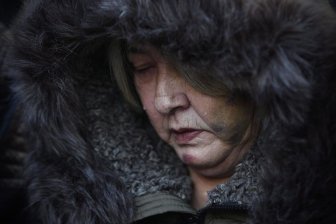As the novel coronavirus pandemic makes its way through the Maritimes, members of the queer community are coming up with creative ways to stay connected, share their talents and ensure the show does indeed go on.

Drag queens and kings in Nova Scotia and New Brunswick are hosting live, online performances called “Sociable Distancing” — shows that have become so popular in recent weeks, they attract upwards of 100 viewers at a time.
Now, they’re teaching other Pride groups across Canada how to host their own shows in an effort to spread their love and artwork in a time of physical distancing.
“Our queer community is our family,” explained Jess Smith, Atlantic regional director for Fierté Canada Pride, ahead of the show on Saturday night.
“They are our mothers, our siblings, our fathers, and that’s why the last show was important to happen when it did, near Mother’s Day, to fill that void for some of the people who are missing their biological mothers. We have our chosen family.”

READ MORE: Patrons mourn loss of one of Halifax’s only queer-friendly bars
Smith co-founded Sociable Distancing with partner Cat MacKeigan almost immediately after the lockdown began in Nova Scotia. It took a few tries to work out the kinks, including technical glitches and copyright issues, but with help from the experts at the Bus Stop Theatre in Halifax, they’ve perfected their Zoom performance technique.
The drag performers are doing their part too, working with green screens, lights and video editing equipment — some for the very first time.
“We’re children of the night, we adapt and we’ve adapted,” said Jason Spurrell, a veteran of the Halifax drag scene known on stage as Rouge Fatale.
“This whole aspect has opened so many doors. … It just opens our community up so much more, because we can have performers from all over the world. It brings our community back.”

READ MORE: ‘Our love is stronger’ — LGBTQ2 community marches against homophobia in Dartmouth
The shows are particularly meaningful in Halifax, said Smith and Spurrell. The city’s only queer-created, queer-staffed and queer-dedicated space, Menz and Mollyz, shut down permanently in April after more than a decade of providing a safe space.
“Not having that physical space and not knowing when we’re going to and if we’re going get a physical space back, (the shows are) giving them a sense that we still have a place to connect and they still have a place for their art,” said Smith.
“Nobody has an actual ‘home’ or church to go to right now,” added Spurrell. “Everybody’s going online, so this is just our variation of it.”
READ MORE: Moose Jaw producer creates music video highlighting importance of staying connected during pandemic
More than 20 queens and kings participated in the online show aired Saturday night. Part of the benefit of bringing their craft online, added Smith, is that it’s accessible to all ages and needs.
“We’re working on having ASL interpreters to interpret, something that’s a little harder to do, but it’s allowing the platform to reach anybody regardless of physical need,” they said.
Karen Blair, an associate professor of psychology at St. Francis Xavier University in Antigonish, N.S., wasn’t surprised to see the queer community come up with the innovative way to stay connected. The risk of isolation is often greater in the LGBTQ2S+ community, Blair added, particularly among elders.
“The drag queens are the glue of this community, they are always the ones that bring people together, whether it’s good times or bad times. They provide entertainment, but they also provide so much more. They provide comfort, they provide a sense of continuity, inspiration.”

Blair is part of a team researching the mental health impact of COVID-19 on Nova Scotians, particularly those in marginalized groups, like the LGBTQ2S+ community. The team hopes to identify their risk factors and learn more about their experiences in addition to some of their successful coping mechanisms.
“Our hope is that the information that comes out of that will help shape the types of responses that policy-makers can have, and the health profession can have in terms of creating timely interventions and supports,” Blair explained.
Those supports could be rolled out in the next few months, said Blair, or in a second wave of COVID-19, if the public is forced back into isolation. The team is currently seeking participants in the study over the age of 18.





Comments